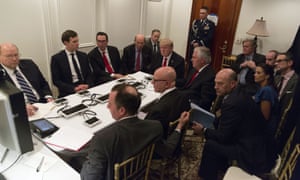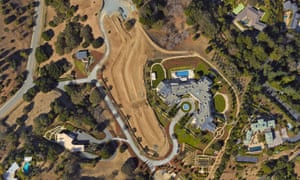Wilbur Ross business links with Putin family detailed in leaked files
Trump commerce secretary's business links with Putin family laid out in leaked files
Wilbur Ross stands to profit from company run by Russians, some of whom are under US sanctions
Jon SwaineSunday 5 November 2017 13.00 EST
Donald Trump’s commerce secretary, Wilbur Ross, is doing business with Vladimir Putin’s son-in-law through a shipping venture in Russia.
Leaked documents and public filings show that Ross holds a stake in a shipping company, Navigator, through a chain of offshore investments. Navigator operates a lucrative partnership with Sibur, a Russian gas company part-owned by Kirill Shamalov, the husband of Putin’s daughter Katerina Tikhonova.
Ross, a billionaire and close friend of Trump, retained holdings in Navigator even after taking office this year. The relationship means that he stands to benefit from the operations of a Russian company run by Putin’s family and close allies, some of whom are under US sanctions.
Corporate records show Navigator ramped up its relationship with Sibur from 2014, as the US and EU imposed sanctions on Russians. The measures followed Putin’s aggression in eastern Ukraine and annexation of Crimea. Navigator has collected $68m in revenue from its Sibur partnership since 2014.
Ross, 79, has apparently faced little official scrutiny over the arrangement. He told a US ethics watchdog that he was keeping a pair of obscurely named holding companies, but did not specify whether he would also retain their interests in Navigator and its lucrative contract in Russia.
The Ross interests appear in the
Paradise Papers, a trove of millions of leaked offshore files reviewed by the Guardian, the International Consortium of Investigative Journalists and other partners. They join
established links between Ross and Russian finance that have raised questions over his selection by Trump to head the US commerce department.
Analysts said the arrangement was troubling. Daniel Fried, an assistant secretary of state for European and Eurasian affairs under George W Bush, said Ross’s connection to “cronies of Putin” threatened to undermine US sanctions.
“I don’t understand why anybody would decide to maintain this kind of relationship going into a senior government position,” said Fried. “What is he thinking?”
Peter Harrell, a senior state department official under Barack Obama, who worked on sanctions against Russia, said: “I’m frankly surprised. Maybe I shouldn’t be, given that with this administration, there seems to be a Russian in every closet.”
Ross’s press secretary, James Rockas, said in a statement that Ross’s holding would not conflict with his government duties on trade and industry. “Secretary Ross recuses himself from any matters focused on transoceanic shipping vessels,” said Rockas.
The new disclosures come amid intensifying inquiries into Russian interference with the 2016 US election. Congress and Robert Mueller, the special counsel, are investigating
possible collusion between Trump’s presidential campaign and Moscow. Ross has dismissed claims of collusion as “rumour and innuendo”.
The involvement of both Ross and Shamalov in the shipping venture dates back to 2011. That year, Ross’s investment firm, WL Ross, began buying into Navigator with an investment that gave Ross two seats on the company’s board. Meanwhile, in Moscow, Shamalov began investing in Sibur, which was formerly state-owned.
By January 2012, having built up his holding in the Russian company, Shamalov, then 29, was made its deputy chairman. That summer, WL Ross took control of Navigator by buying a further $110m stake from the collapsed Lehman Brothers bank.
Shamalov is the son of Nikolai Shamalov, one of Putin’s oldest friends from St Petersburg, where Putin worked in the mayor’s office. He married Katerina, Putin’s younger daughter, in a secret ceremony in February 2013.
Later that year, two ships from Ross’s company began transporting liquefied gas out of Russia for Putin’s son-in-law’s firm under a decade-long contract initially worth $226m.
Towards the end of the year, Navigator went public on the New York stock exchange, its share price buoyed by the Sibur deal. WL Ross more than doubled its money, prompting Ross to boast in remarks to a convention that his firm had hit “a home run” by taking over Navigator.
Shamalov drastically increased his holding in Sibur in September 2014. He borrowed $1.3bn from the state-controlled Gazprombank – his brother, Yury Shamalov, is the bank’s deputy chairman – and used this to buy a chunk of Sibur from
Gennady Timchenko, who is under US sanctions. The US Treasury
said in 2014 that Putin held investments in Timchenko’s oil-trading firm, which it denied.
Ross stepped down from Navigator’s board in November 2014. His replacement was Wendy Teramoto, then managing director of WL Ross. Teramoto has since resigned from the businesses to join the
Trump administration as Ross’s chief of staff.
Shamalov insisted he had received no preferential treatment in the Sibur deal and had received his stake on strictly commercial terms.
Karen Dawisha, the director of Russian and post-Soviet studies at Miami University, Ohio, said it should be assumed that Putin benefited from the prosperity of companies run by his relatives and close associates.
“Shamalov is a very important member of Putin’s circle and there is no question that he is closely trusted,” said Dawisha. “He was not well trained for the job at Sibur – but he was well connected.” Shamalov has a law degree from St Petersburg State University, according to Sibur.
Shamalov stepped down as deputy chairman in 2015. He remains a director of Sibur.This year, he reduced his 21.4% stake in the company, which was worth about $2.85bn, to 3.9%. This was completed in April, while journalists were looking into Sibur’s connections to Ross. The reason for the sale was unclear.
Shamalov sold to Sibur’s main shareholder, Leonid Mikhelson. Mikhelson is Russia’s richest man, according to Forbes magazine, and CEO of the gas producer Novatek. The Obama administration twice imposed sanctions on Novatek, once in 2014 over Ukraine and again in 2016 as
punishment for Moscow’s meddling in the US election.
The offshore commerce secretary
Under the Navigator-Sibur deal, two ships – the Navigator Libra and the Navigator Leo – began moving Sibur gas from the Russian port of Ust-Luga, west of St Petersburg, to Scandinavia and elsewhere in Europe. The partnership doubled to four ships this year, as Ross joined Trump’s administration. Invited to name the new vessels, Sibur christened them Navigator Luga and Navigator Yauza, after Russian rivers.
Corporate records show that the proportion of Navigator’s revenue coming from Sibur almost doubled between 2014 and 2015, even as Sibur’s owners complained of being shut out of financial markets due to sanctions.
Sibur has also received assistance from the Kremlin while dealing with Ross’s firm. In May 2014, a Russian government fund led a $700m investment in the Ust-Luga port, where Sibur has exclusive rights to ship liquefied gas. In December 2015, Sibur received a $1.75bn state loan repayable at a third of the market rate.
Rockas, Ross’s press secretary, tried to distance Ross from the Sibur deal with a series of statements that were contradicted by other sources. He said the Navigator-Sibur deal was signed in February 2012, before Ross joined the Navigator board. But Sibur’s annual report for that year said the deal was signed in March.
Rockas said Ross did not join Navigator’s board until 31 March 2012. But a press release filed to the
Securities and Exchange Commission on 2 March that year said Ross was by then already on the board. In ethics forms filed this year, Ross estimated that his start date had been January 2012.
Rockas said: “No funds managed by WL Ross & Co ever owned a majority of Navigator shares.” But a press release issued by the company in August 2012 was titled “WL Ross Agrees To Acquire Majority Stake In Navigator”.
Navigator vessels also carried out extensive business with the Venezuelan state oil company PDVSA, records show, at a time when Venezuela’s government was cracking down on opposition. Trump imposed sanctions on PDVSA in August.
Rockas said Ross “has been generally supportive of the administration’s sanctions of Russian and Venezuelan entities.” He said Ross had never met Shamalov, Timchenko or Mikhelson.
The Paradise Papers detail a complex web of dozens of offshore investments that have been held by Ross, who publicly champions Trump’s campaign promise to “bring back” business to the US. Many use similar names and acronyms that are difficult to decipher.
The files show, for instance, that Ross is a shareholder in WLR Recovery Associates IV DSS AIV GP, a Cayman Islands investment vehicle. This is a shareholder and general partner of WLR Recovery Associates IV DSS AIV LP, another Cayman Islands entity, which is in turn a general partner of WLR Recovery Fund IV DSS AIV LP, a third Cayman firm, which is a shareholder in Navigator.
said in January that Ross’s ethics disclosures suggested he was making a “clean cut” from Navigator by divesting from WL Ross. “Mr Ross’s apparent departure is to avoid conflict of interest,” it said, before quoting a remark made by Ross during his Senate confirmation hearing: “I intend to be quite scrupulous about recusal.”
Ross and the Russians
Ross built lucrative connections to Russian business during a 40-year career that banked him an estimated fortune of $2.9bn, making him comfortably the wealthiest member of Trump’s cabinet.
His private equity firm, WL Ross, earned him a reputation as a ruthless corporate raider. Ross took over bankrupt companies, turned them around by slashing costs, and sold them for large profits. An early critic of free trade, who profited from tariffs to protect US steelmakers, Ross has been deputised by Trump to fulfil the president’s populist campaign promise to overhaul international trade deals.
In 2014, Ross led a €1bn takeover of the Bank of Cyprus, a favoured destination for Moscow oligarchs seeking to store their wealth. The bank’s biggest shareholder at the time was the Russian billionaire Dmitry Rybolovlev. In 2008, as the US began to fall into a financial crisis, Rybolovlev bought a Florida mansion from Trump for $95m. The future president had paid $41m for it four years earlier.
Also invested in the bank takeover was the billionaire Russian industrialist Viktor Vekselberg. Vekselberg, who owns the world’s biggest collection of Fabergé eggs, attended the now infamous December 2015 dinner in Moscow for the Kremlin TV channel RT, where Trump’s future national security adviser Michael Flynn was photographed next to Putin.
Ross sat on the senior leadership team of Bank of Cyprus alongside Vladimir Strzhalkovsky, a former KGB colleague of Putin’s who is also on the board of several state corporations in Moscow.
And in 2015, while Ross was vice-chairman of the bank, its Russia-based businesses were sold off to Artem Avetisyan, a Russian businessman who had been appointed by Putin to lead an agency responsible for strengthening ties between the Kremlin and business.
@DonKnock @SJUGrad13 @88m3 @Menelik II @wire28 @smitty22 @Reality @fact @Hood Critic @ExodusNirvana @Blessed Is the Man @THE MACHINE @OneManGang @dtownreppin214 @JKFrazier @tmonster @blotter @BigMoneyGrip @Soymuscle Mike @Grano-Grano @.r. @GinaThatAintNoDamnPuppy!





 THIS shyt JUST BROKE ON BBC NEWS TOO...
THIS shyt JUST BROKE ON BBC NEWS TOO...






